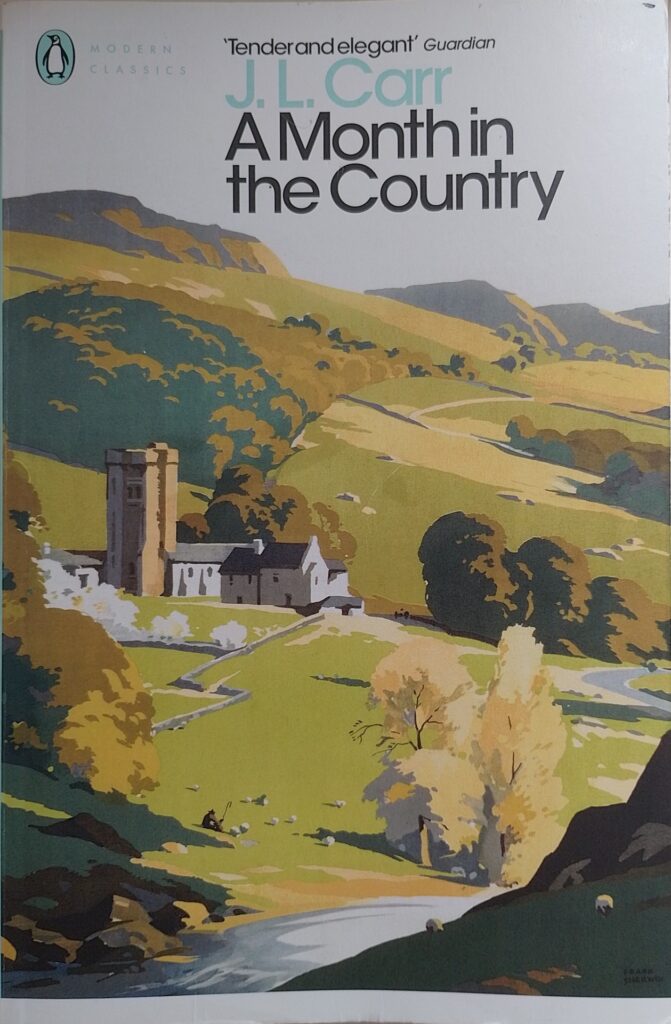A Month in the Country by J. L. Carr
First published 1980. Penguin paperback, 2016, pp104, c.36,000 words.
Although short, this is a superb novel. The protagonist, Tom Birkin, looks back at a brief episode of his life when he was a young man from London and had spent a summer in a small, remote Yorkshire village uncovering a medieval wall painting in the local church. It has a similar wonderful, elegiac feel to Lee Fermor’s Between the Woods and the Water: a man towards the end of his life reflecting on a world that has now disappeared and how that time when he was young was such a formative episode in his life. Although Carr knew well the landscape he describes, this is fiction not memoir.
Set a few years after the first world war, Birkin is still recovering from the physical and psychological damage he suffered as a soldier on the front lines. To add to his troubles, he has a serially unfaithful wife who has left him for another man. He has been commissioned to execute the terms of a will to reveal the picture which was whitewashed centuries ago. The vicar is not an enthusiast for what Birkin is doing and is stiff and unwelcoming. During the project Birkin sleeps in the belfry of the church and lives very simply. Gradually he gets involved in village life as the curious come and visit him at work and he accepts invitations to modest, hearty meals. The friendliest are from the non-conformist people who attend ‘Chapel’ rather than the church.
Another outsider, Moon, has also been commissioned by the will, in his case as an archaeologist, to try to find a distant ancestor who was buried outside the church boundary for unknown reasons. Moon has also suffered from the war and is also using the isolation and work to heal.
Birkin’s two most regular visitors are Kathy Ellerbeck, a knowing, precocious pre-teen, and Alice Keach, the vicar’s wife. Mrs Keach is very beautiful, likened to Venus from Botticelli’s Primavera. She seems unaware of her beauty, trapped, like Venus, in her circumstances. Birkin and Moon speculate on how the vicar managed to get Alice to marry him – the Keaches seem such a mismatched pair.
Far from sneering at the northern rural folk as crude rustics, Carr gives us open and decent people, welcoming a stranger to their community. The setting is a glorious summer, with warm sun dispelling early morning mist. The countryside is verdant and overgrown. Most travel is by horse and cart, although the railway and bicycles are present. Entertainment is restricted to what can be made locally: cricket matches, a Sunday-school outing, church services, family meals. Life is not bad for those who don’t raise their heads up high. Kathy Ellerbeck may feel its constraints when she grows up, the Keaches both do.
The drama in the story comes from what Birkin’s and Moon’s work will reveal, and the growing relationship between Alice Keach and Tom Birkin. This is a story very much rooted in a time and place where and when the direct question is never asked. Tom Birkin is looking back at the episode from his late maturity as both a time of healing and also with regret at what past so briefly and is now lost.
Carr writes with simple elegant language. There are frequent touches of humour. A small, apparently insignificant episode can be made hugely illuminating and pre-figuring, for example, when Birkin is alone in the church he explores: ‘However, there was one good wall monument – a Baroque bas-relief of a well-built young lady, Laetitia Hebron, modestly hiding her essential glory by hanging on tightly to a shroud as she clambered from an elegant catafalque… along with a few rather fine lines by her young husband… Most loving and delightful wife… I had a second look at Laetitia, a long look after that testimonial. Her tightened shroud showed her to advantage. And she had a friendly face with a teasing upward turn of her lips… He’d had better luck than me.’ [pp15-16]. Later Birkin is being pressurised into taking a service in a small chapel in a nearby village. His final objection being overcome with the loan of a bicycle. Edgar, Kathy Ellerbeck’s younger brother ‘found me a pair of bicycle clips. Until then I’d been rather fond of Edgar.’ [p65].
Carr is also very good at human behaviour: ‘surely we shouldn’t be required … to justify the ethic of our labour? Our jobs are our private fantasies, our disguises, the cloak we can creep inside to hide’ [p48]. ‘Most country people had a deep-rooted disinclination to sleep away from home and a belief that, like as not, to sojourn amongst strangers was to fall amongst thieves’ [p62]. ‘If I’d stayed there, would I always have been happy? No, I suppose not. People move away, grow older, die, and the bright belief that there will be another marvellous thing around each corner fades. It is now or never; we must snatch happiness as it flies’ [p79].
An absolutely magnificent story, terrifically well written.
Wikipedia biography of Carr: https://en.wikipedia.org/wiki/J._L._Carr
Wikipedia summary of the book: https://en.wikipedia.org/wiki/A_Month_in_the_Country_(novel)
Others’ reviews of the book: https://www.goodreads.com/book/show/60707.A_Month_in_the_Country?ref=nav_sb_ss_1_22
© William John Graham, July 2024

